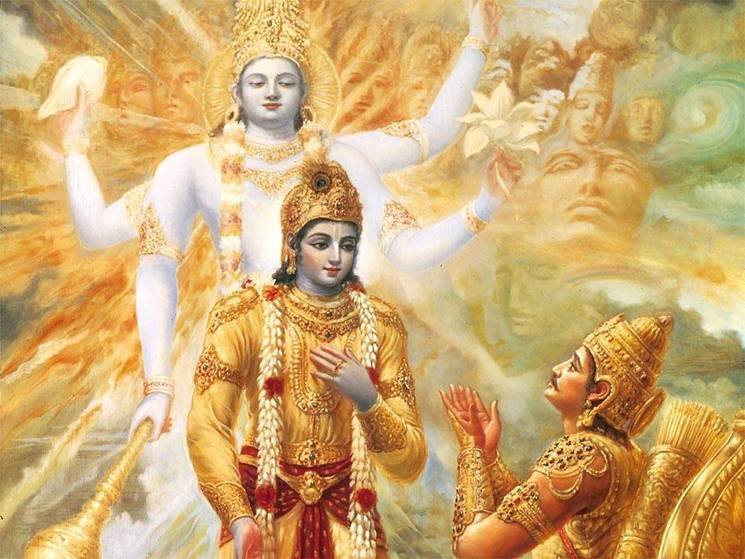Q. What is the relationship between Krishna and Dharma?
Answer by Romapada Swami: Dharma or the codes of religion are laid down by God Himself. This is stated by Yamaraja, or Dharmaraja, who is the executor of these laws: “dharmam tu saksat bhagavat pranitam – real religious principles are enacted by the Supreme Personality of Godhead Himself.” No one else – not even the topmost demigods fully situated in the mode of goodness, what to speak of fallible human beings – can manufacture religious principles. (SB 6.3.19) Thus Krishna is the establisher of Dharma.
This is natural because principles laid down by the Supreme Personality of Godhead, Krishna, can alone be infallible and universally applicable to everyone. Manufactured ideologies and rules legislated by any imperfect person or by collective opinion are bound to be defective & biased and cannot benefit all living entities at all times. Thus, real religious principles are those given by the Lord Himself in the form of Vedic scriptures. The Vedas are not man-made, they are ‘apaurusheya’, directly manifested from the breathing of the Supreme Lord.
Krishna also states in the Bhagavad-gita that He comes to re-establish religious principles – ‘Whenever there is a decline in religious principles (dharma) and predominant rise of irreligion (adharma), Krishna appears within this world to reestablish the principles of religion.’ (BG 4.7-8)
The codes of dharma are quite intricate and at times even appear contradictory and irreconcilable. What holds well as dharma for a particular person or circumstance can prove to be unrighteous in a different situation. However, knowing dharma to be the laws of God, we can also understand that the ultimate purpose of dharma is to please Krishna – this becomes the basis for ascertaining what is dharma and reconciling differences.
This is the verdict given by Suta Gosvami when asked by the assembly of sages to kindly tell, in an easily understandable way, the highest religious principle and the essence of all scriptures. Suta Goswami answers right away without any hesitation or ambiguity that “the supreme occupation [para-dharma] for all humanity is that by which men can attain to unmotivated and uninterrupted loving devotional service unto the transcendent Lord” and “the highest perfection of performing one’s occupational duty (dharma) is to please the Personality of Godhead – samsiddhir hari tosanam.” (Srimad Bhagavatam 1.2.6&13)
Quite often there seems to be much cause for perplexity as to what the standard of dharma should be in a particular circumstance/context. This is the setting in which the Bhagavad-gita is spoken, in response to Arjuna’s bewilderment about his real duty or dharma, and his subsequent surrender to Krishna as a disciple. Krishna’s conclusive direction to Arjuna was “sarva dharman parityajya mam ekam sharanam vraja” – to abandon all other subordinate varieties of dharma and surrender to Him exclusively.
In several instances, it appears to the uninformed that in the course of His pastimes Krishna is violating or inducing others to violate the principles of righteousness — which those who do not have a deep grasp of Krishna’s transcendental position find it extremely difficult to comprehend. A typical example is Krishna encouraging Maharaja Yudhisthira to speak a lie in order to overpower Dronacharya. Krishna is however establishing through these instances that true morality and the highest dharma is to abide by Him and please Him – this is the real criterion and the Absolute basis on which the right course of action is to be decided in all circumstances.
In other words, virtue for the sake of virtue without caring to please Krishna is not beneficial. There are examples of asuras like Ravana and Jarasandha observing Vedic regulations, respecting brahmanas, and liberally giving charity, etc. But because they were inimical towards Krishna, the ultimate goal and shelter of all religious principles, their so-called adherence to dharma were of not much value. On the other hand, by trying to please Krishna, even if it means transgressing conventional codes of ethics, as when Yudhisthira spoke an untruth or the gopis and wives of the brahmanas left their homes to meet Krishna, their actions are considered to be the highest dharma. (We should note however that these are not meant to encourage licentious/irreligious behavior in the name of service to Krishna. These are exceptional examples meant to illustrate a higher principle, whereas in the normal course of life Krishna’s devotees strictly abide by the highest theistic conduct, for the sake of pleasing Krishna, and under the guidance of saintly devotees, mahajanas who are well-versed in the application of scriptural conclusions apt to time, place and circumstances.)







